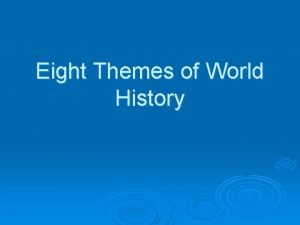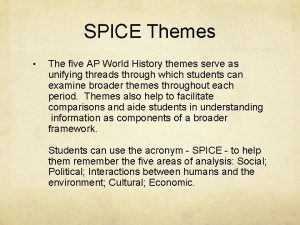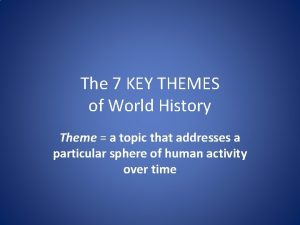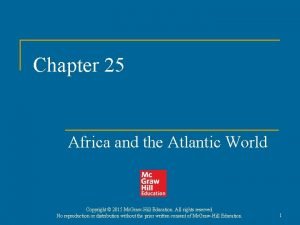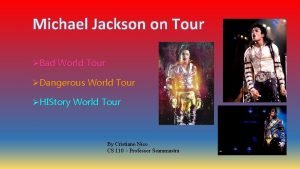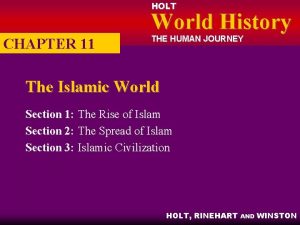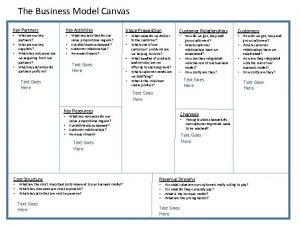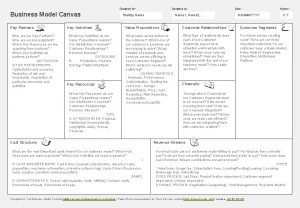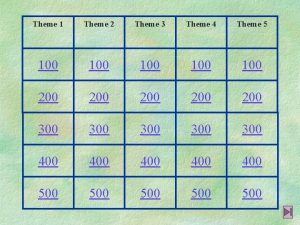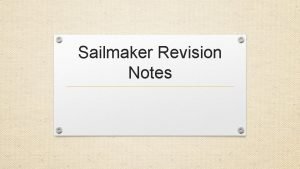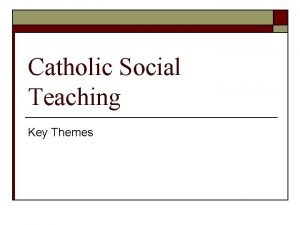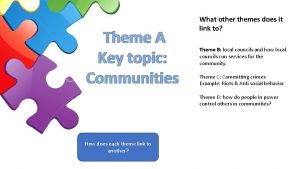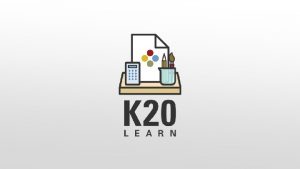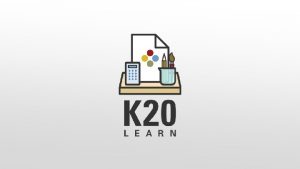The 7 KEY THEMES of World History Theme




















- Slides: 20

The 7 KEY THEMES of World History Theme = a topic that addresses a particular sphere of human activity over time

#1 - Patterns of Population • This theme comes first because the number of men and women in the world, the distribution of populations around the globe, and the migration patterns of people from one region to another have always had a large effect on all other types of change. • The study of population size, density, and distribution is called demography.

#1 - Patterns of Population • Conditions of population growth and density have a huge impact on how people live, work, and get along together. In the long run of human history, the presence today of more than 7 billion people on the planet represents a recent and drastic change. • This fact, together with the constant flux in worldwide population movement and distribution, affects our daily lives in countless ways.

#1 - Patterns of Population

#2 - Economic Networks and Exchange • Most of us are dependent on the market for virtually all our material desires and needs. • We also rely more and more on it for vital, useful, or entertaining information. • Most of the goods and information we consume originate from producers we will never see or know. Many of them live thousands of miles away.

#2 - Economic Networks and Exchange • The things we consume reach us by way of complex systems of communication and transport that we are scarcely aware of. As either working teenagers or fully employed adults, most of us contribute something to this global economy. • Also, fluctuations in production, finance, and trade in distant parts of the world may seriously affect our income, employment chances, and career plans.

#2 - Economic Networks and Exchange • How did we become so dependent on the global economy, and how might that dependence affect the direction of our lives? • Answers to these questions require a worldhistorical perspective, not only the "globalizing" developments of the past few decades but the long-term trends that transformed trade from a secondary human economic activity to one that none of us can do without.

#3 - Uses and Abuses of Power • Changing power relations have been one of the central themes of world history. Teachers AND students may ask many critical questions about power: – Was power always present in human society? If so, why? If not, how was power created? – Why are differences in power so enormous in the modern world? – How do the powerful hold on to their power? – Could inequalities of power be eliminated? Should they be? – Do the weak always have to tolerate the power of the strong? Could the weak survive without the strong, or the other way around? – Are people bound to abuse power? (The English historian Lord Acton wrote: "All power corrupts and absolute power corrupts absolutely. ")

#3 - Uses and Abuses of Power • Today, all humans (with tiny exceptions) live within the frontiers of sovereign states. • States have central governments, which exercise great power over their citizens whether they are democracies or dictatorships, big countries or small. • In world history governments have exerted power in many different ways, sometimes benefiting their subjects or citizens, sometimes restricting or endangering them.

#3 - Uses and Abuses of Power • Because we live in the computer age, we understand that possessing and controlling information is a way of exerting power. • States, corporations, interest groups, universities, and other holders of power both control and disseminate floods of valuable information. • Governments and other power groups have always had an interest in managing the flow of news and knowledge.

#4 - Haves and Have-Nots • Today, the allocation of the world's wealth is more uneven than ever before. Some individuals and groups have become extremely wealthy, while others have become poorer. Today, these disparities are global. • Power and wealth tend to be two sides of the same coin. Social inequality in both power and wealth reflect the general principle that as human populations in many parts of the world have become larger and denser, the gap has grown between those at the top and those at the bottom of the social hierarchy.

#4 - Haves and Have-Nots • No matter what country we live in, social and economic inequalities among individuals and groups are part of our daily experience. • From ancient times, extreme inequalities have triggered social protest, revolts, and revolutions. • In the past, revolution and inequality have often gone together. We may ask whether growing gaps between have and have-nots are a threat to currently stable societies.

#5 - Expressing Identity • Knowing who we are greatly influences how we behave and how others behave toward us. • A sense of shared identity expressed in many forms and situations has been a powerful shaper of human action throughout history. • It can motivate people as powerfully as the desire for wealth or power, and it can lead to both horror and heroism.

#5 - Expressing Identity • History as a discipline is very much about identity. Learning about the past means learning about the identities of many sorts of communities and how those identities may have appeared, changed, and vanished. • Understanding the historical identities of those communities to which we feel we belong is a powerful way of defining our sense of identity in the world.

#6 - Science, Technology, and the Environment • Humans are living creatures and, like all of them, they need to draw energy and resources from their environment. • How humans have done this from paleolithic times to the present is one of history's dramatic stories. • Science and technology have transformed, and continue to transform, the daily lives of all peoples.

#6 - Science, Technology, and the Environment • Making some sense of the world around us and understanding how and why we live the way we do-as individuals, families, employees, and citizens-require at least a modest grasp of the immense changes that have occurred in the world in the past two centuries, which is barely a page in the long chronicle of human history.

#6 - Science, Technology, and the Environment • Human systems of knowledge are utterly unlike those of other organisms because humans seem to have a never-ending capacity to add to and transform them. This explains why humans have had such a huge impact on the environment and on one another. • In exploring Key Theme #6, we are really exploring what it is that makes human beings so special.

#7 - Spiritual Life and Moral Codes • For most of human history, spiritual ideas have been at the core of how humans understand explain the workings of the natural, physical, and social world. • No wonder that people have stood up, and sometimes died, for their religious principles, or that societies have built their sense of unity and identity around their spiritual traditions.

#7 - Spiritual Life and Moral Codes • Human beings learned long ago that peace, order, and cooperation within social groups, whether they be families, foraging bands, business partnerships, or nation-states, depend in the long run on guiding principles, standards, and rules of moral behavior. • Systems of morality and ethics vary around the world, but all of them are founded on ideals of social harmony and trust.

#7 - Spiritual Life and Moral Codes • Today, many people argue that modern science presents a powerful challenge to religion because it offers explanations of nature, the cosmos, and human origins that require no reference to God or any other manifestation of spiritual power. – Also, the material evidence that science presents to support its description of the natural and physical universe has continued to pile up, especially during the past century. • Few doubt that science, technology, and medicine have benefited humankind in countless ways. • For some people, however, science and religion start from such contradictory premises that they cannot be reconciled.
 8 themes of history
8 themes of history Spice theme
Spice theme 7 key themes of history
7 key themes of history Ap world history chapter 25 africa and the atlantic world
Ap world history chapter 25 africa and the atlantic world Bad dangerous tour
Bad dangerous tour Holt world history the human journey
Holt world history the human journey What are key activities in a business model
What are key activities in a business model Contoh bisnis model canvas makanan pdf
Contoh bisnis model canvas makanan pdf Hát kết hợp bộ gõ cơ thể
Hát kết hợp bộ gõ cơ thể Lp html
Lp html Bổ thể
Bổ thể Tỉ lệ cơ thể trẻ em
Tỉ lệ cơ thể trẻ em Voi kéo gỗ như thế nào
Voi kéo gỗ như thế nào Chụp phim tư thế worms-breton
Chụp phim tư thế worms-breton Hát lên người ơi
Hát lên người ơi Các môn thể thao bắt đầu bằng tiếng đua
Các môn thể thao bắt đầu bằng tiếng đua Thế nào là hệ số cao nhất
Thế nào là hệ số cao nhất Các châu lục và đại dương trên thế giới
Các châu lục và đại dương trên thế giới Công của trọng lực
Công của trọng lực Trời xanh đây là của chúng ta thể thơ
Trời xanh đây là của chúng ta thể thơ Cách giải mật thư tọa độ
Cách giải mật thư tọa độ
